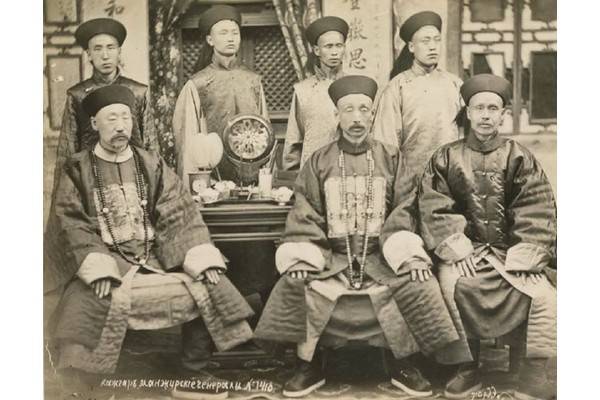Livadia Treaty: Russia saves Chinese Muslims

Officers of the Manchu-Chinese Army in Xinjiang, 1880 photo
The agreement between Russia and China, signed on October 2 of 1879 of the year, allowed to move about 100 to thousands of Uighurs and Dungans within the Russian Empire
Russia's establishment of diplomatic relations with China began with the signing of the Nerchinsky Treaty in 1689. From now on, both sides of the relationship were built on the basis of mutually beneficial agreements, and the controversial issues that arose were tried to be resolved peacefully.
Interaction between the countries intensified after the advancement of Russia in the first half of the XIX century to the Central Asian region. The border between the Russian Empire and the Qing Empire became the longest land border in the world, and St. Petersburg was extremely interested in that the influence of the states hostile to our country was not established in the border areas.
Therefore, when the Dungan-Uygur uprising broke out in 1862 in East Turkestan or Xinjiang, the main participants of which were representatives of the Hui people - "Chinese Muslims", Russia sent troops into this territory.
After the expulsion of the Qing administration, the rebels created three Muslim states: the Dungan sultanate, the Tarachi khanate, and the Jetyshar. The ruler of the latter, Yakub Bey, was strongly influenced by British advisers who insisted on invading the Tarachi khanate bordering Russia, which occupied an important strategic and economic Ili valley.
The emergence of Muslim state formations, one of which was under the control of the British, the alarming situation on the border, accompanied by a series of armed clashes, forced Petersburg to decide on the introduction of troops into the Iliysky region.
The Qing government gave permission to use military force, for China it was not the first time that Russia was viewed as a military ally, so in 1730, the Qing embassy tried to enlist the support of the Russian government in the fight against the Dzungars.
“Our intervention in the affairs of Western China has the sole purpose of assisting the Chinese to restore their power in the rejected western provinces of the empire,” Alexander II stressed in his message to the Russian ambassador to China.
Russian troops under the general command of Lieutenant-General Gerasim Kolpakovsky in June 1871 entered the territory of the Ili Sultanate, so the rebels called a state entity, and very quickly put things in order.
The question of the future of these territories was to be decided by diplomacy. In Russia, two approaches to resolving the issue have been highlighted. The first, it was shared by the military, was in favor of preserving Russia of the Kuldzhinsky region, which is an extremely advantageous strategic position.
The military believed that the transfer of the territories of the Qing Empire would contribute to the Chinese strengthening in the region: "The consolidation of this dominion is hardly consistent with our interests in Central Asia."
In addition, the transfer of territories dominated by Muslims to the power of Buddhist China will undermine the credibility of Russia in the Islamic world, which has always highly valued the religious policy of the civil authorities of Russia with its main principle of non-interference in matters of faith.
The second approach, followed by diplomats, who assumed the return of the Kuldja Territory to China, indicated the practical benefit of Russia. The trade with China, which is 30 million rubles, could sharply decline, as a result, the state treasury could lose serious revenue.
The military and diplomats found a common solution, which, after a long negotiation process, was made by the Chinese side.
The final document was signed on September 20 (October 2) 1879 of the year in the Crimea, in the Livadia residence of Alexander II. China was represented by the Ambassador Extraordinary and Plenipotentiary of the Bogdykhan to the Russian court of Chun Hou. Russia - Deputy Foreign Minister Nikolai Girs and Russian Ambassador to the Chinese Court Yevgeny Butsov.
According to the agreement, the western part of the Iliysky Territory (at present it is the territory of a large part of the Uygur, Raiymbek and Panfilovsky districts of the Almaty region of Kazakhstan) and the valley of the Tekes river with the strategically important Muzaratsky pass went to Russia, which was about 30% of the entire territory of the region. The population of these territories, which were planning to join the Semirechensk region, expressed a voluntary desire to become part of Russia.
They also intended to resettle all the inhabitants of the region who were ready to accept the citizenship of the Russian Tsar.
The Russian autocrat, as stated in the statement “... takes you [the Muslims] under their high protection and patronage, along with their other subjects ... Do not be afraid of the Chinese and do not leave the countries where your ancestors found eternal peace and where every piece of land is hard-worked yours. "
The Muslim population of the region was even ready to move to Siberia, just not to remain in the corrupt Chinese administrative system, besides pursuing a policy of discrimination based on national and religious grounds.
For the local population, 10 years of the Russian “occupation” became quite a sufficient period to compare the two forms of government, Russian and Chinese. For the local Russian voted "feet", just over 100 thousands of people moved to the borders of the Russian Empire.
The Russian Sinologist Vasily Vasilyev called the Dungar resettlement “unprecedented stories humanity fact. "
The Livadia Treaty caused a strong discontent of certain political circles in China. The Qing government refused to ratify it, which was the result of pressure from Britain, who feared the strengthening of the Russian empire in Central Asia and Western China.
The parties will return to this issue after a year and a half, the result of which will be the 1881 Treaty on the Ili Krai.
Information